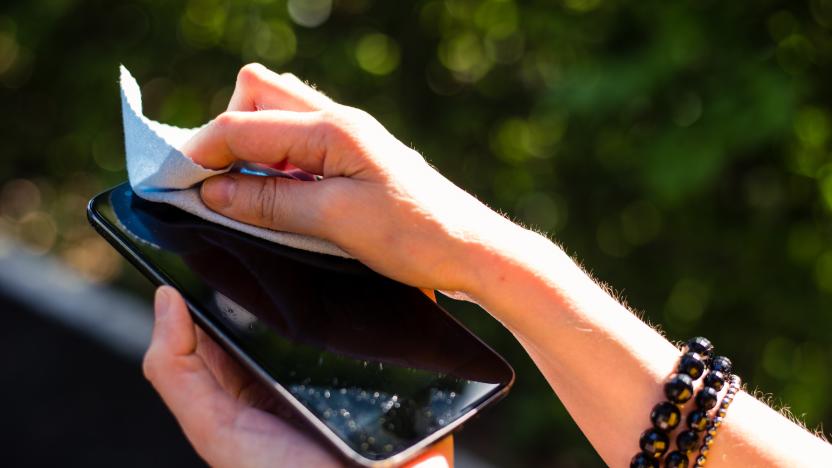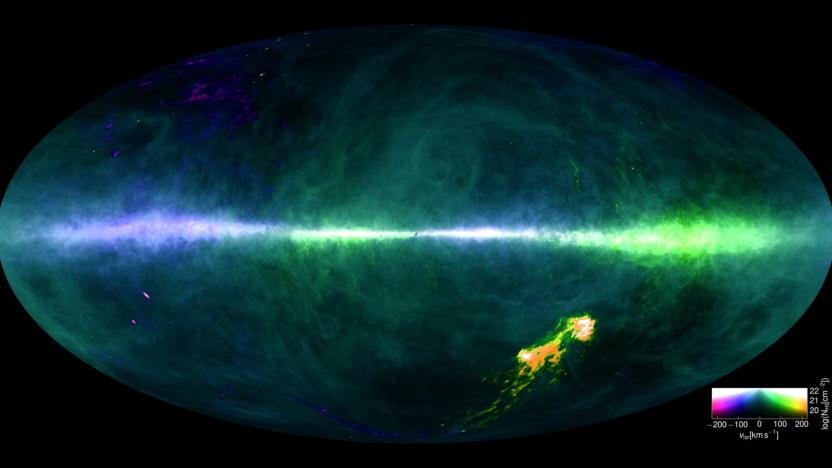CSIRO
Latest

Research finds coronavirus can survive on phone screens for 28 days
The virus that causes COVID-19 can stay active on non-porous surfaces like smartphones for much longer than the flu virus, according to researchers from Australia’s national science agency.

Australia is forming its own space agency
Australia is finally getting its own space agency. After months of talks, the federal government has decided it's time the land down under is on par with other developed nations -- including its neighbour New Zealand -- and has put $50 million aside to launch the program.

Graphene film makes dirty water drinkable in a single step
Every year, millions of people around the world die from drinking unclean water. Now, researchers have developed a process that can purify water, no matter how dirty it is, in a single step. Scientists from Australian research organization CSIRO have created a filtration technique using a graphene film with microscopic nano-channels that lets water pass through, but stops pollutants. The process, called "Graphair", is so effective that water samples from Sydney Harbor were safe to drink after being treated.

Scientists map the Milky Way Galaxy in exceptional detail
There have been detailed maps of the Milky Way before, but none quite so ornate as this. Researchers in the HI4PI sky survey have created a fine-grained map of our home galaxy using its most common material: neutral atomic hydrogen. Such studies have taken place before, as you might guess. However, the use of 10 billion data points from large radio telescopes (the Parkes Observatory and Effelsberg 100m) and noise-filtering algorithms have produced an image with twice the sensitivity as the previous best, and four times the angular resolution. The result? A view of the Milky Way so comprehensive that you can finally see the finer details of cloud structures in between stars -- they were too blurry before.

Floating robots will find out what keeps the Indian Ocean healthy
Believe it or not, scientists don't know a lot about how the Indian Ocean works. Without many samples, researchers are frequently left in the dark about the ways that fish, plankton and other aquatic life flourishes in the area. That won't be a challenge for much longer, though. Australia's national science agency is launching a fleet of BioArgo robots that will measure both the biological and physical traits of the ocean to learn what makes it healthy. Much like the Argo machines studying Arctic waters, they'll float deep underwater (nearly 6,600 feet) and drift with the current. They'll usually need to surface only when they're transmitting their findings. Combined with satellite imagery, the BioArgo drones should give researchers a true "3-dimensional picture" of the Indian Ocean -- important when a sixth of the human population depends on this sea for basics like food and transportation.

Scientists solve solar energy's burning question: how to make it cheaper than fossil fuels
In a fight between solar and fossil fuels, the latter has always had a killer question up its sleeve: "What about supercritical steam?" That's the method by which the most advanced power stations generate electricity, superheating water until it instantly becomes steam, a feat that's only possible (and affordable) by burning coal or gas. Or, at least it was. Australia's Commonwealth Scientific and Industrial Research Organization has managed to use solar energy to the same effect, boiling liquid to temperatures of 570 degrees Celsius in a test chamber. What does this mean for all of us? "Power plants of the future could instead be using the free, zero-emission energy of the sun," explains Dr. Alex Wonhas.

Australia Square Kilometre Array Pathfinder goes live as the world's quickest radio telescope
Australia's Shire of Murchison is quickly becoming a hotbed for radio telescopes. As of of Friday, the territory is operating the world's fastest radio telescope in the form of the Australia Square Kilometre Array Pathfinder (ASKAP). The 36-antenna grid's eventual use of six phased array feeds, each with 188 receivers, will let it scan a field of view 150 times larger than the moon's visible area while processing that information much faster than a typical single-pixel radio telescope feed -- CSIRO estimates that an image of the Centaurus A galaxy that would take 10,000 hours to process with rivals should take five minutes with ASKAP. Ultimately, the array should grow to 60 antennas as part of the Square Kilometer Array, which includes South Africa in its hunt for pulsars, quasars and other unique parts of the universe. Just don't get your hopes up for booking alien listening sessions anytime soon. Commissioning started virtually as soon as the ribbon was cut, and scientists have already scheduled their usage slots for the next five years. We're sure we'll get over any frustration when we see the first ASKAP results published within the next year.

CSIRO snatches $220m windfall in WiFi patent dispute with AT&T, T-Mobile and Verizon
Australia's Commonwealth Scientific and Industrial Research Organization keeps bowling 'em over -- in the courtroom, anyway -- with its hardy WiFi patent. The government-funded research group has chalked up another $220 million win after AT&T, T-Mobile, Verizon, Acer, Lenovo and Sony each agreed to establish licenses with the litigious group. CSIRO now holds agreements with 23 companies and has pocketed more than $430 million from its courtroom activities. Australian Senator Chris Evans estimates that 90 percent of the industry is now paying licensing fees for the technology, but with the patent set to expire next year, we'd be mighty paranoid to be among that final ten percent. You'll find the full PR, chock-full of Aussie pride, after the break.

CSIRO's Ngara internet transmission project begins in Tasmania, shows hopes for rural broadband
Hard to say if you're aware, but Australia's Commonwealth Scientific and Industrial Research Organization (best known 'round these parts at CSIRO) was the first to develop the WiFi transmission technologies that are widely used on Planet Earth today, and they've got stacks of infringement lawsuits to prove it. Now, the organization is testing out a radical new approach to solve the rural broadband problem, and rather than relying on newly opened spectrum or other forms of black magic, they're simply tasking existing analog TV antennas to work a little overtime. Put simply, Ngara uses the broadcast towers that already exist in rural towns that receive television signals, and then with a new set-top box and a modified TV antenna, it's able to funnel broadband internet into faraway homes. Recent tests in Tasmania -- sections with higher populations of Devils than Earthlings -- have shown the uplink working just fine, but they're still a good ways out from getting data to download. Project manager David Robertson surmises that it'll be around four years before the technology is ready for the commercial market, and you can bet your bottom (Australian) dollar that we'll be counting down the days. And so will everyone else stuck in the Big Apple wondering why Jimmy McMillan didn't get elected for mayor. [Image courtesy of Geoff Ambler / CSIRO]

CSIRO's patent fight targets more victims: AT&T, Verizon Wireless, and T-Mobile
Is anyone safe from the wrath of Australia's Commonwealth Scientific and Industrial Research Organization? It's looking unlikely, with the company expanding its patent lawsuit furor to cover three more major players: AT&T, Verizon Wireless, and T-Mobile. These three are the latest cherry-picked to be on the receiving end of CSIRO's mighty 802.11a/g patent hammer. Companies like Dell, Microsoft, Nintendo, and Sony all chose to settle rather than challenge this patent bully, giving it the encouragement (and cash) to bring the fight to these three new players, apparently named simply because they sold WiFi devices. Sadly, there are more to come according to Executive Director Nigel Poole: I'm not going to be exposing what the legal strategy is to a journalist. There's a legal strategy here that has been thought through very carefully and to a lay person it looks like a pincer movement. You've got court action against upstream chip makers and you've got court action against downstream carriers. Ever pass on an old WiFi-equipped gadget on eBay or gave it to a friend in exchange for a case of beer? Lord Humongous is coming for you next. [Thanks, Chris]

CSIRO looks to analog TV spectrum for 100Mbit wireless broadband
Australia has already rolled out its plans to bring high-speed broadband to 90% of the country's population via fiber optic lines, and it looks like the folks at CSIRO are now pitching in with some ideas of their own to bring speedy wireless broadband to that ever present "last mile," and anyone else looking for an extra wireless option. As with others, they're looking to take advantage of all the analog TV broadcast towers that'll become available once the digital switchover in the country is complete, and it seems that they also have a few tricks up their sleeves that could eventually deliver wireless speeds up to 100Mbit per second (though it'd apparently be between 12 and 50 megabits per second initially). To reach those speeds, the group is apparently experimenting with a combination of orthogonal frequency division multiplexing (or OFDM), used in basic wireless standards like 802.11g, and multiple input multiple output technology, or MIMO, which uses a range of antennas to transmit and receive multiple data streams. Of course, there's still quite a bit of work to be done before any of that moves beyond the lab, but CSIRO says that field trials could begin in 12 to 24 months, with a commercial rollout possible in the next three to five years.[Thanks, Aaron]

CSIRO's patent lawsuits conclude with the final 13 companies settling
Looks like CSIRO's legal days are over -- for the moment, at least. Having already reached an agreement with HP, the Australian government-funded research firm announced this week that it's settled with the remaining 13 companies it sued for patent infringement, claiming it owned the rights to 802.11a/g. For those who haven't been keeping track at home, that includes Dell, Intel, Microsoft, Nintendo, Fujitsu, Toshiba, Netgear, Buffalo, D-Link, Belkin, SMC, Accton, and 3Com. The details of any of the settlements are undisclosed, but as iTnews reports, it's expected CSIRO ended up with some substantial monies now that the dust has settled. Chief Executive Dr. Megan Clark noted that it'll continue to "defend its intellectual property," so if you're a high profile tech company who creates WiFi-equipped gadgets and hasn't been served a lawsuit yet, we don't blame you for being a little nervous right now.

CSIRO settles patent lawsuit with HP, continues fight with everyone else
As anyone up on their patent fights these days is no doubt aware, Australia's CSIRO (or the Commonwealth Scientific and Industrial Research Organization) has been engaged in a long-standing dispute with seemingly every company that makes use of WiFi in their products, and even the organization responsible for the 802.11 standard itself. Now, following a short lived victory against Buffalo, the group has reportedly reached a settlement in its lawsuit with HP, although all of the parties involved are unsurprisingly staying mum on any specifics for the time being. As Australia's Sydney Morning Herald notes, however, the settlement will no doubt give CSIRO a boost in confidence as it continues to challenge the remaining companies now entangled in lawsuits, which includes everyone from Microsoft to Dell to Nintendo, and free up a bit more time for the group to get back to creating even rounder objects and more stylish power-generating shirts.[Thanks, Greg]

Buffalo's wireless injunction stayed, now free to sell WiFi products in US
Man, we can bet there's some serious celebrating going on at the Buffalo offices today. After being barred from selling its networking gear here in America last June, Buffalo has finally been freed from its CSIRO-given chains. Who's to thank? A federal judge who has stayed the permanent injunction in the ongoing US patent litigation, which opens the doors for the company to sell "IEEE 802.11a, 802.11g and 802.11n compliant products in the United States." Finally, we USers can look forward to buying helicopter inspired routers on our home turf.[Thanks, Mark]

Scientists create roundest objects in the world
Okay, so we could pretty much figure out that JVC's breath sphere speaker wasn't exactly the roundest thing we'd ever seen, but we can't say we've really ever given much thought to how round / not round a round object really is. Thankfully, the scientists involved in the Avogadro Project do give it some thought, and they're toiling away as we speak in an attempt to create almost useless silicon balls which serve one simple purpose: to "redefine the kilogram in terms of magnetic fields and electrical forces." What does weight have to do with this? Currently, the kilogram is the "only remaining standard of measurement tied to a single physical object: a 120-year-old lump of platinum and iridium that sits in a vault outside of Paris, France." Trivial? A bit -- but don't tell that to the guys that weigh gold bars.

CSIRO developing power-generating shirts
We've seen a plethora of shirts made for more than just satisfying a core necessity in life, but a team of scientists over at the CSIRO's Energy Technology Division are hoping to have "power shirts" at your local flea market (or other fine establishments) within five years. By using piezo electrical materials, the garb could reportedly "produce electricity as you move," enabling users to juice up their DAPs, mobiles and air conditioned pants just by staying active. Other potential applications include powering battlefield-related equipment on soldiers and monitoring systems on the elderly, but making sure it can handle the oh-so-intimidating wash cycle remains a challenge. [Via PopGadget, image courtesy of CSIRO]

CSIRO throws 802.11n ratification a curve
CSIRO and aggravation tend to go hand in hand, so it's no real shock to learn that the organization is playing hard ball in a recent push to get 802.11n closer to ratification. Reportedly, CSIRO "refused to provide a letter of assurance to the IEEE working group developing the much-delayed 802.11n WiFi standard," and it cited legal discord between it and Microsoft, Intel, Dell, HP, Netgear, Toshiba, Fujitsu, Nintendo and 3Com as the primary holdup. The group's senior vice-president of licensing, Denis Redfern, was quoted as saying that "where litigation is involved, CSIRO will continue to reserve its rights in relation to licensing," so it looks like an official 802.11n standard is still that far off from being founded.

CSIRO injunction halts Buffalo sales
As we reported back in November, Australian company CSIRO has been on the offensive in an attempt to establish their role in the creation of WiFi. Last Friday, CSRIO won another round in the battle by bringing an injunction against Buffalo, promptly halting sale of products in the US and making it very difficult for Buffalo to continue scoring tons of easy money from 802.11a/g-based gear. Buffalo is naturally expected to appeal, but this is pretty clearly a litmus test case for the long list of companies CSRIO has its sights set on -- so who knows what fates are in store for the likes of 3Com, Accton, ASUS, Belkin, D-Link, Dell, Fujitsu, Hewlett-Packard, Intel, Marvell, Microsoft, Netgear, Nintendo, SMC, and Toshiba, all of which have their own case pending with today's court victor.[Thanks, Macris A]

Australians to demo 10 gigabit wireless data link
We're not exactly sure how we got along before the advent of WiFi (wait, nevermind, we were tethered to our desks), but today we can't wait for the next generation of wireless technology. Well, leave it to Australia's Commonwealth Scientific and Industrial Research Organisation to come out of the blue and develop gigabit (yes, gigabit) wireless technology. According to CSIRO's website, the new wireless protocol will use the 55GHz band and will transfer at 10Gbps -- the organization will be showing of this tech by transmitting 16 streams of DVD-quality video over a distance of 250 meters (820 feet), which will apparently only be "one-tenth of the capacity of the link." We've got no idea how long it'll be until our friends Down Under send us some of that gigabit love, although they might want to settle those lawsuits against nearly every American wireless hardware firm first. [Via Computerworld Australia]

CSIRO wins landmark WLAN lawsuit against Buffalo, more to come?
The same folks who brought us fire-proof plastic, air guitar clothing, and wireless air hockey apparently delivered a lot more of the WiFi technology we all utilize daily than was previously recognized. Australia's Commonwealth Scientific and Industrial Research Organization has won a landmark case against Buffalo Technology, "under which it could receive royalties from every producer of WLAN products worldwide." US patent 5487069 -- which "encompasses elements of the 802.11a/g wireless technology that is now an industry standard" -- was granted to the body back in 1996, and has subsequently been utilized in seemingly every piece of wireless kit ever since. Considering their recent victory, CSIRO's pending cases against Intel, Dell, Microsoft, HP, and Netgear definitely have roots now, and if judges continue to rule in the Aussies' favor, the big boys could be shelling out "hundreds of millions of dollars" in back pay to cover their wrongs. Ruh roh.[Thanks, Phil]







